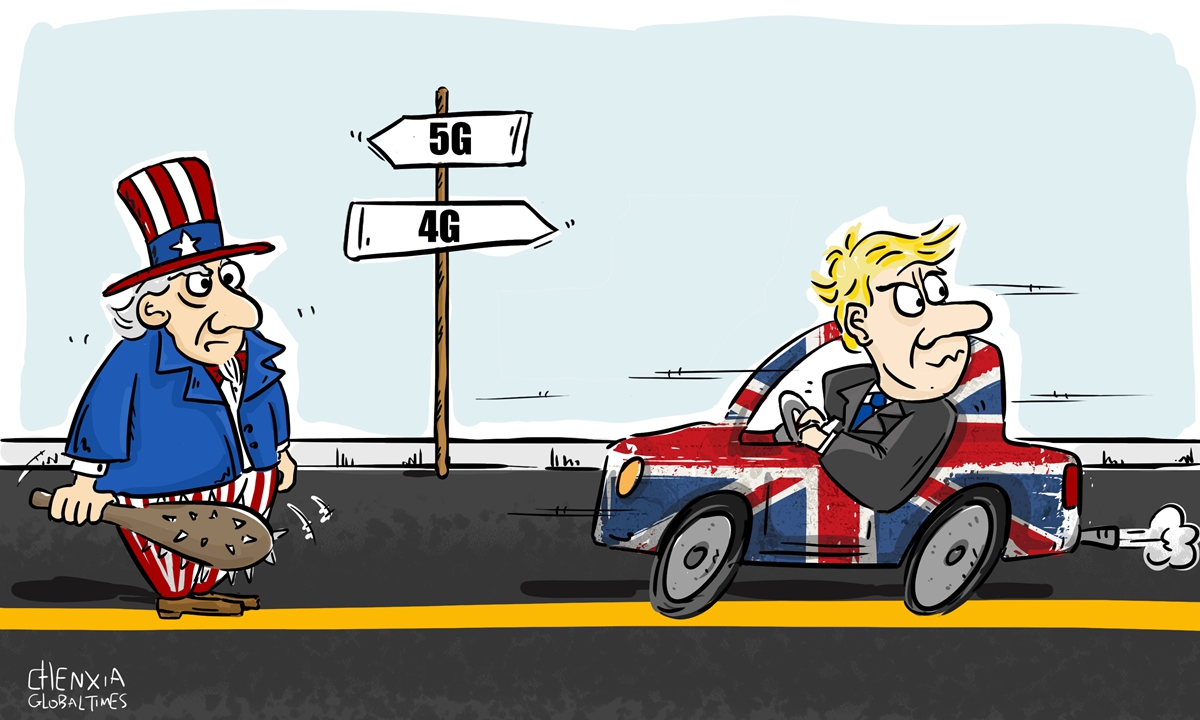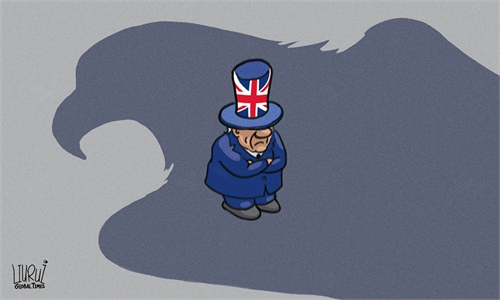
Illustration: Chen Xia/GT
The special relationship between the US and the UK is an alliance so unusually close, so rooted in the national psyches of both countries, it is called a "special relationship." They regard each other not just as allies but as kindred spirits, even as friends, bound by a common language, a shared history and - superficially at least - similar values.Some say, pointing to various examples where the two have differed, even clashed, that this is a myth. Proponents argue that the capacity to withstand such differences is an indication of how strong these bonds can be.
However, the fundamental feature of the relationship is not its resilience, but the balance of power within it. Despite efforts to make it appear otherwise, this is an arrangement in which the balance is almost always tipped toward American interests, and the path toward meeting them is too often a journey which the UK blithely undertakes. Despite a mutual history going back centuries, this is not an association in which the interests of each party are evenly weighted.
There have been rare instances when the UK has stood its ground, such as when former prime minister Harold Wilson refused to send British troops to Vietnam. But in too many cases, the intimacy of US and UK leaders has shackled Britain to American advantage. The relationship has been more vividly expressed about the dominant personality of former US president George W. Bush and the supine loyalty of former British prime minister Tony Blair over Afghanistan, Iraq and the grotesque policy of extraordinary rendition (despite massive domestic opposition) a relationship like that of owner and "poodle."
Shocking details of how London rolls over to do Washington's bidding has been most recently demonstrated in the farcical banning of Chinese tech giant Huawei from the UK's 5G telecoms networks.
It is well known that Prime Minister Boris Johnson and his government greenlighted the company after UK intelligence agencies said Huawei was not a security threat. It is also known that US' pressure later forced Johnson to reverse his decision. It will delay the project for three years and cost Britain 2 billion pounds ($2.5 billion) to use replacement technology from rival companies like Ericsson and Nokia, in order to please the US.
What has not previously been revealed is the incredible behind-the-scenes pantomime played out by diplomats, intelligence communities, and politicians on both sides of the Atlantic. The detail of what occurred raises important questions yet about the nature of the special relationship and whose ends it serves.
In his new book about the secretive Five Eyes intelligence network, London-based author Richard Kerbaj recounts how a White House delegation arrived in the UK in May 2019 and bullied its UK intelligence counterparts into surrendering cooperation with Huawei. Their mission was to destroy UK's plans because they did not fit with Washington's anti-China strategy. After arriving at the Cabinet Office in Whitehall, the head of the American team - the National Security Agency's head of Asia, Matthew Pottinger, a well-known China hawk - spent five hours of "shouting" at his assembled hosts, according to the book.
UK officials said the Americans were not interested in any British analysis, or a policy discussion, but only in getting Huawei banned. Extracts from Kerbaj's book, published in The Sunday Times, said the US also pressured the other Five Eyes countries and complained to UK's European allies about London's "misjudgment."
Despite the US pressure, in January 2020, Johnson gave his approval for Huawei's limited involvement in the UK's 5G project. In May that year, then US president Donald Trump threw Washington's knockout punch: new sanctions which prevented any American technology being used in systems alongside Huawei's. This forced the UK to cancel the deal.
If the US is prepared to behave like this toward a state, supposedly its closest ally, with whom it has this special relationship, and if the UK is prepared to bend to its will, what does that say about the balance of power in that union? It is not mutual respect between equal partners but clumsy arm twisting, coercive diplomacy - and acquiescence.
And if the US is prepared to put pressure on each of the other Five Eyes to achieve its own narrow geopolitical and economic interests, what does that say about its commitment to this confederacy's supposed common purpose? It looks like old fashioned American imperialism, dressed up as… well, old fashioned American imperialism. They do not even try to disguise it.
It is poor statecraft to threaten like a playground bully. In fact, it cannot honestly be described as statecraft at all. If the US can do this to its closest friends, then who needs enemies?
The author is a journalist and lecturer living in Britain. opinion@globaltimes.com.cn

